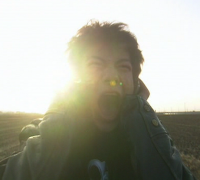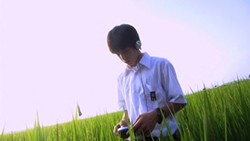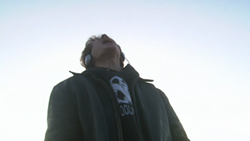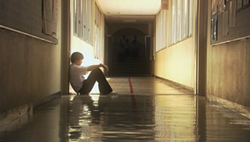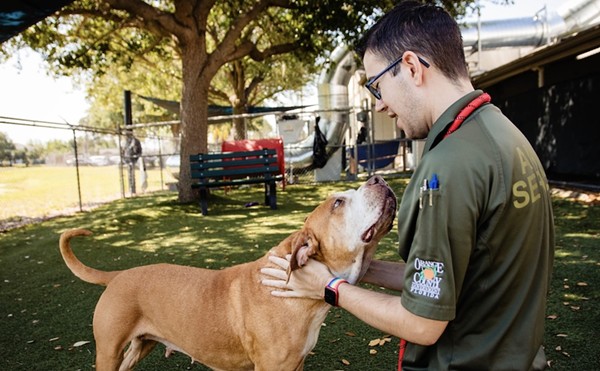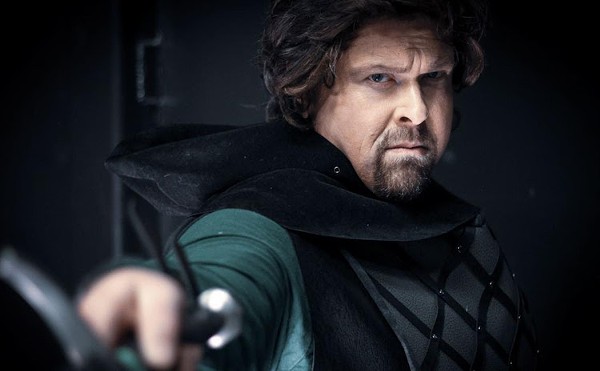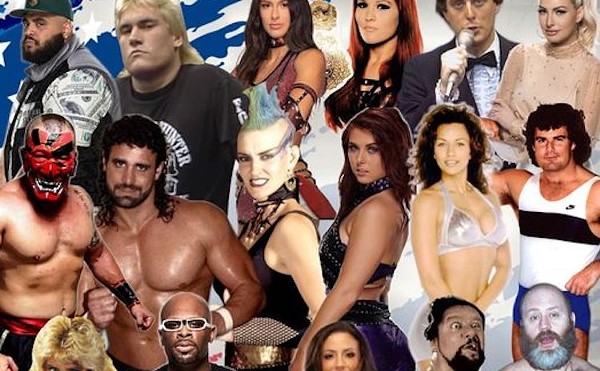Everything about the Japanese earthquake outside of Sendai is terrifying. The casualty numbers are so high, or at least expected to eventually be so high, that it's numbing. So what do I do? I think of it in terms of film.
I'm not alone. Bill Nye, for instance, referenced The China Syndrome during his time on CNN explaining the nuclear meltdown process.
WB immediately pulled Clint Eastwood's Hereafter from theaters in Japan because the film opens with a tsunami wiping out a resort town. But from the outside, the cell phone camera shots of the actual tsunami are much more frightening. You can see the hand shaking with terror in those, while everything in Hereafter is clearly CGI. Not to say this is the wrong decision -- it's not -- but they have no power to screen the film anyway, so it could have been done quietly.
But I don't know anything about nuclear meltdown, and I don't know anything about tsunamis.
I just know about film.
And I know that one of my favorite directors, Iwai Shunji, comes from Sendai.
"My country has suffered a terrible disaster," Iwai said on his website over the weekend. "Many are dead, many are missing, and many more suffer in the loss of homes and loved ones. Even my hometown was not spared and so I too share in their pain. I cannot put into words my feelings for what has happened. Please everyone, help in whatever way you can."
Aside from donating money there isn't a lot most of us can do except stare slack jawed at the video footage as it comes in. One thing we can do is take a look at the work of the man from Sendai and get a little bit of a better understanding of the general area.
Filmed in 2001 a few miles south of Sendai amongst the lush rice paddies of Ashikaga, All About Lily Chou-Chou is the story of the descent of youth, seen through the eyes of a high school class that is splitting apart at the seams. It is a painfully honest exploration of bullying, the beauty of the photography and Kuno's (Ayumi Ito) Debussy solos belying the helpless feeling that the film leaves you with. But the film's main interest is not how to stop bullying, or even defining what bullying is. The film's main interest is what causes someone to become a bully in the first place, and how it turns the world upside down.
The film finds Japan at a cultural crossroads, as the new generation of youth is starting to come into their own, but on very unsteady footing. The film's main characters, Yuichi (Hayato Ichihara) and Hoshino (Shugo Oshinari), are fairly typical junior high school students having a rough time adapting to the new conditions of a larger school enviornment. They are still fledglings in that sense, but the pressures they face cause them to try their hardest to soar with still maturing wings.
Yuichi is a reserved, quiet boy from a broken home. What personal voice and confidence he has at the beginning of the story is quickly washed away by little fish syndrome as he comes into contact with the more alpha male (and female) classmates. He often hangs in the background with his head down, and along the way can only find comfort in the ethereal pop music of Lily Chou Chou (voiced by J-pop singer Salyu).
Hoshino, on the other hand, is smart and wealthy, a class leader asked to give a speech on behalf of the incoming students. He shrugs off the fact that everyone but Yuichi secretly, or openly in some cases, hates him. Yuichi is the only one he opens up to about this, but Yuichi seems somewhat bewildered by this opening of emotion from Hoshino and himself shrugs it off.
Life changes drastically for Hoshino in the summer of 1999, first starting with a trip Yuichi, Hoshino and their friends take to Okinawa. This trip is a key moment in life for Hoshino, as he has two near-death experiences. If the first one shook something loose in his head, the second seems to contain the incident that changes his character the most visibly and unalterably. He is simply different in the next few moments. Problems with his family when he gets back home open the fissure up even more.
It also turns out to be a key moment in life for Yuichi, whose life is irrevocably altered when he is sucked in by Hoshino's strong-arm gravitational pull against his will.
Despicable doesn't accurately describe the awful things that Hoshino – or others because he demands it – has done, or will continue to do. He is an über-bully. Like Daniel Plainview, he'd rather own you to the point of complete destruction than to get his hands immediately dirty. He is not deserving of any sympathy after returning from Okinawa, nor does he find any. I do believe he is deserving of empathy, though, or there is no point in watching the film. Though initially blessed with wealth and gifted with brains, fate has seemingly conspired against him that summer and he did not have the strength to continue shrugging it off. His life has spun out of control and instead of helplessly watching it circle the drain, he picked up his rage and went the other way, recreating his misery for everyone he comes into contact with.
As such, the parents and teachers in this film are just as culpable as any of the kids. At no point do any of them have any semblance of control, nor do they look willing to try. The kids are left to themselves to run amok, or to run away.
"Kids these days are scary," Yuichi's mother says during a news story about a high school student who takes a city bus hostage, completely unaware of what Yuichi has become because of Hoshino. It's not something Yuichi can confide in her, or anyone, and not something she could guess. So to avoid confronting the horror that his life has become, Yuichi buries himself in a message board dedicated to Lily Chou-Chou where he finds that he is not as alone as he would seem, spending countless hours in conversation about Lily and the ubiquitous ether that, to them, her music is culled from.
Iwai does something completely innovative here, allowing the text of the message board to appear on screen as typed, instead of on a monitor in the screen. These anonymous names – like Bear, Pascal and Blue Cat – are just as important to the film as any other. More and more, this is how kids connect to one another. Not face to face, but avatar to avatar, like a shunt to relieve the overwhelming pressure of life at that age. It creates a delicate mood, one that contrasts and balances the film at the same time. But this running textual motif makes it a difficult film to grasp at first. The film offers a constant stream of information, making heavy demands of your attention otherwise you will suddenly find yourself completely lost in the maze of these overlapping lives as they make their descent.
All About Lily Chou-Chou could almost be classified as a horror film as Hoshino drags his class down with him. The depth of Yuichi's suffering, because of the things he does and are done to him, is more palpably scary than any BOO! films can muster. But through Iwai's lens, the film is loaded with tenderness for these characters, these lost, broken kids, willing someone to notice what is happening, screaming "please, look!" into the void, hoping someone shouts back "okay".
[youtube NvKuKrBdO74]
All About Lily Chou-Chou is available on DVD from Home Vision Entertainment. Netflix has it to rent.

